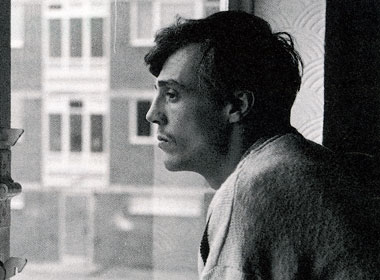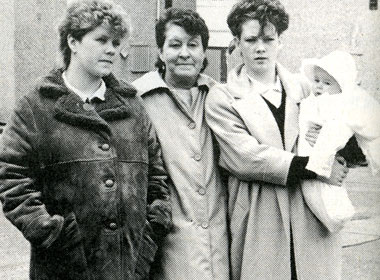LIVING ON THE EDGE - OVERVIEW
![]() Living On The Edge is a remarkably successful and intensely moving fusion of two different visions. On the one hand it is a clear continuation of Mike Grigsby’s quite remarkably consistent oeuvre, which has allowed the exploited, the forgotten, the taken-for-granted, the voiceless to speak at some length and in their own words.
Living On The Edge is a remarkably successful and intensely moving fusion of two different visions. On the one hand it is a clear continuation of Mike Grigsby’s quite remarkably consistent oeuvre, which has allowed the exploited, the forgotten, the taken-for-granted, the voiceless to speak at some length and in their own words.
On the other hand it relates to a long-term project undertaken by John Furse, the film’s producer and co-deviser, entitled The Struggle For The Land, which he wrote but never filmed. In this he attempted to analyse what he terms the “selling of reality”, utilising collage form to discuss the historical forces at work in moulding people’s everyday experience. ![]() Julian Petley: The Monthly Film Bulletin, June1987
Julian Petley: The Monthly Film Bulletin, June1987
By the mid-1980’s Central TV had become the home to a stable of outstanding British documentarists originally nurtured by Sidney Bernstein and Denis Forman at Granada TV during the 1960’s, among them Mike Grigsby. Richard Creasey, Central’s Head of Documentaries and an exceptional TV executive in his commitment to the creative freedom of the filmmaker, was backing the idea of Mike doing a ‘state of the nation’ documentary.
Mike’s departure point, inspired by his parents, was the sense of betrayal of the post-War dream - of greater social and economic emancipation in Britain, particularly for the working class - beneath the rising tide of Thatcherism’s free market capitalism. As in his previous work, he wanted the film to be based on families.
I was excited by working with Mike again. I’d been his researcher on A Life Apart, a Granada TV documentary about the deep-sea trawling community of Fleetwood in Lancashire, which has been twinned over the years with John Grierson’s Drifters in ‘classics’ screenings from the British Film Institute Archive.
Mike’s eye and ear for image and sound, his long, still, beautifully composed scenes giving people the space to speak in their own rhythms, his tone and pacing, were for me the hallmarks of a real, individual and essentially poetic filmmaker.
I saw an opportunity to realise a number of key ideas for documentary experiment which I’d been working on some years previously on a project of my own The Struggle For The Land. The marriage of these ideas with Mike’s well established style of filmmaking - something of a Powell & Pressburger relationship with I as the Emeric Pressburger to his Michael Powell - was to result in a film that is seen to stand out from his other work.
In a pioneering move for a network TV documentary Living On The Edge was theatrically released on the art-house circuit in May 1987 before its TV transmission. It was one of nine films from cinema and TV, drama and documentary since the 1930’s (including Coalface, Cathy Come Home, The Life And Times Of Rosie The Riveter, Roger And Me) featured in a book study of documentary aesthetics The Art Of Record (1996) by John Corner.
Mike is recognised as a premier British documentarist, with major retrospectives at the National Film Theatre in London in 2004 and the Dinard Film Festival in 2006. The two other documentaries I worked on with him A Life Apart (Granada TV 1973) and The Time Of Our Lives (BBC2 Fine Cut 1994), another 'state of the nation' film, were among those selected as key examples of his work, along with Living On The Edge which was featured as a pinnacle of his over 40-year career.
Mike Grigsby died suddenly on March 12th 2013 - ‘One of the giants of British documentary filmmaking.’ (British Film Institute). His last collaborator Rebekah Tolley and I did an interview with Matthew Sweet on Mike for BBC Radio 3 Free Thinking transmitted on October 22nd 2013.

